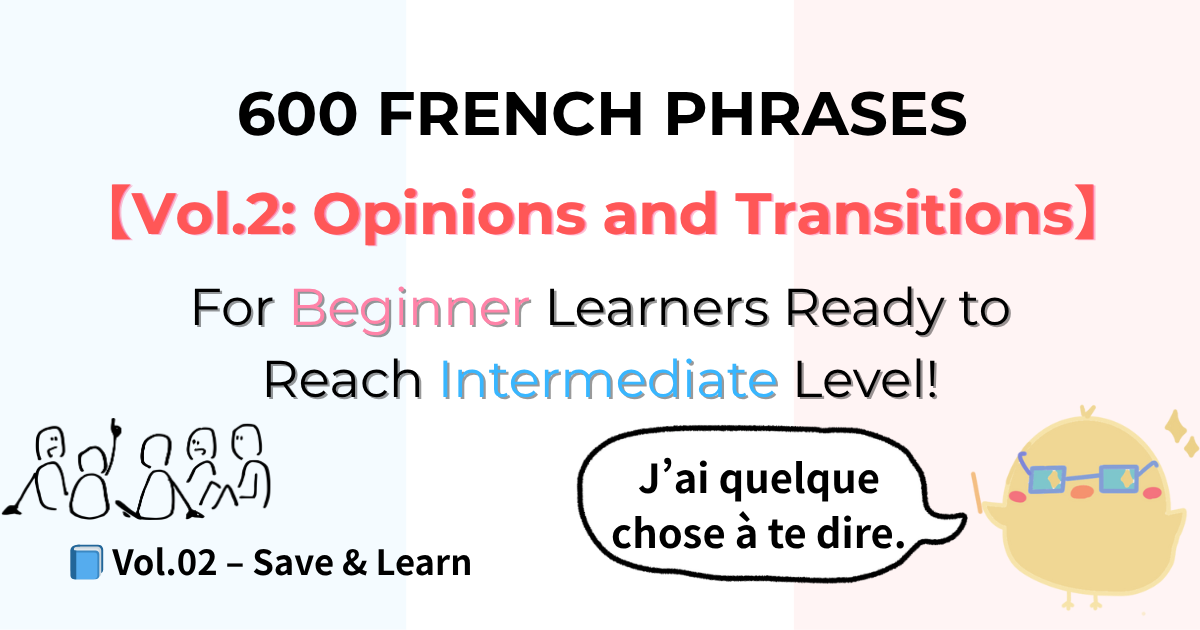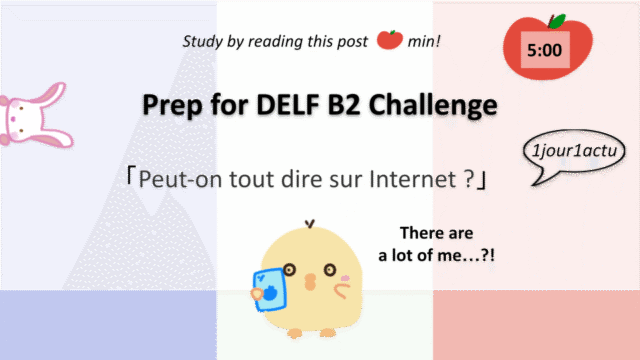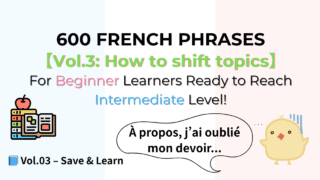600 Useful French Phrases – Vol.2: Mastering Opinions and Transitions(011–020)

This series is for beginner learners ready to reach intermediate level!
🎯 What’s this post about?
Have you ever struggled to express your opinion, break awkward silence, or tell someone something delicate in French? In this second post of my 600 French Phrases series, we’ll explore phrases that help you speak your mind and guide the conversation smoothly, whether you’re talking to friends, co-workers, or your host family.
🗣️ Key Focus of This Volume
In this volume, we dive into expressions that are commonly used to:
- Introduce a topic gently
- Express conclusions or priorities
- Share your opinion, even when it’s difficult
- Make transitions in conversation
These are gold for real-life conversations and for DELF B2 speaking/writing exams!
🔟✨ Today’s 10 Key Phrases(011–020)
📘 No.011–020: Speak Your Mind, Naturally
011. J’ai quelque chose à te dire. / I have something to tell you.
A natural way to bring up a personal topic or start a serious conversation.
📘 Mini Dialogue Practice
A: Excuse-moi, j’ai quelque chose à te dire. C’est un peu délicat…
B: Bien sûr, je t’écoute.
A: Sorry… I have something to tell you. It’s a bit delicate.
B: Of course, I’m listening.
🧠 Grammar & Usage Notes
- avoir quelque chose à + infinitive = to have something to do (→ something to say)
- te dire = “to tell you” (direct object pronoun + infinitive)
012. Nous devons de parler quelque chose. / We need to talk about something.
Polite but serious. A typical intro when discussing important matters.
📘 Mini Dialogue Practice
A: Tu as une minute? Nous devons parler de quelque chose d’important.
B: Oui, dis-moi.
A: Do you have a minute? We need to talk about something important.
B: Yes, go ahead.
🧠 Grammar & Usage Notes
- devoir = to have to; nous devons = we have to
- parler de quelque chose = to talk about something
- quelque chose d’important = note the use of de before adjectives after quelque chose
013. Avant tout, / First of all,
Used to express a top priority or lead into your main point.
📘 Mini Dialogue Practice
A: Avant tout, je tiens à te remercier pour ton soutien.
B: Oh, c’est gentil.
A: First of all, I want to thank you for your support.
B: That’s very kind of you.
🧠 Grammar & Usage Notes
- avant tout = literally “before all” → “first of all”
- tenir à + infinitive = to really want to do something
014. Tout d’abord, / First of all,
Similar to avant tout, but slightly more neutral and commonly used in logical structures.
📘 Mini Dialogue Practice
A: Tout d’abord, je voudrais préciser que je ne suis pas contre votre idée.
B: D’accord, je t’écoute.
A: First of all, I’d like to clarify that I’m not against your idea.
B: Alright, I’m listening.
🧠 Grammar & Usage Notes
- tout d’abord = a common opener in structured discourse
- je voudrais = polite form of “I would like”
- préciser que = to make clear that…
015. Au départ, / In the beginning,
Perfect for explaining how things started or your initial thought.
📘 Mini Dialogue Practice
A: Au départ, je pensais que ce travail serait facile.
B: Et, maintenant?
A: At the beginning, I thought this job would be easy.
B: And now?
🧠 Grammar & Usage Notes
- au départ = “at the start” (used with past tenses)
- je pensais que… = imparfait for expressing past thoughts
- serait = conditional of être (“would be”)
016. Après tout, /After all,
To wrap up a statement with a sense of reason or justification.
📘 Mini Dialogue Practice
A: Je ne voulais pas y aller, mais après tout, c’était pas si mal.
B: Comme quoi, il faut essayer!
A: I didn’t want to go, but after all, it wasn’t that bad.
B: That’s why you should try!
🧠 Grammar & Usage Notes
- après tout = “after everything” → “after all”
- Comme quoi = “Which shows that…” or “That proves…” (→ Used to draw a lesson from what was just said.)
- il faut + verb = “You have to…” / “It’s necessary to…”
017. En fin de compte, / In the end,
When you want to share the final decision or outcome after some thought.
📘 Mini Dialogue Practice
A: En fin de compte, j’ai décidé de rester ici encore un an.
B: Je crois que c’est une bonne idée.
A: In the end, I decided to stay here one more year.
B: I think that’s a good decision.
🧠 Grammar & Usage Notes
- en fin de compte = “in the end” (neutral or reflective)
- décider de + infinitive = to decide to do something
- encore un an = “one more year”
018. Finalement, / Eventually, finally
To express the final result or shift in a situation.
📘 Mini Dialogue Practice
A: Finalement, ils ont accepté ma proposition.
B: Tu vois? Il fallait juste un peu de patience.
A: Eventually, they accepted my proposal.
B: See? You just needed a little patience.
🧠 Grammar & Usage Notes
- finalement = finally, eventually (don’t confuse with enfin!)
- ils ont accepté = passé composé (completed past action)
- il fallait = “it was necessary” → from falloir
019. Je voudrais juste te dire… / I just wanted to say…
Kind and natural. Softens the tone when you want to express thanks or affection.
📘 Mini Dialogue Practice
A: Je voudrais juste te dire merci pour hier.
B: Oh, avec plaisir!
A: I just wanted to say thank you for yesterday.
B: Oh, it was my pleasure!
🧠 Grammar & Usage Notes
- je voulais = imparfait of vouloir → past intention
- juste = “just” (limiting adverb)
- te dire = “to tell you” (direct object)
020. Laissez-moi vous dire ce que j’en pense/ Let me tell you what I think.
Polite yet firm. Often used in debates, meetings, or disagreements.
📘 Mini Dialogue Practice
A: Laissez-moi vous dire ce que j’en pense. Ce projet est risqué:
B: D’accord, je prends note.
A: Let me tell you what I think: this project is risky.
B: Alright, I’ll take note.
🧠 Grammar & Usage Notes
- laissez-moi = let me (from laisser)
- vous dire = to tell you (formal or plural)
- ce que j’en pense = “what I think about it” → en = about it/from it
📎 Coming Next
Vol.3 – Phrases No.021–030: Connect Naturally & Keep the Conversation Flowing
In the next post of the 600 Useful French Phrases series, we’ll explore expressions that help you recall things, express uncertainty, and smoothly switch topics — essential for staying natural and confident in real-life conversations!











Leave a Reply